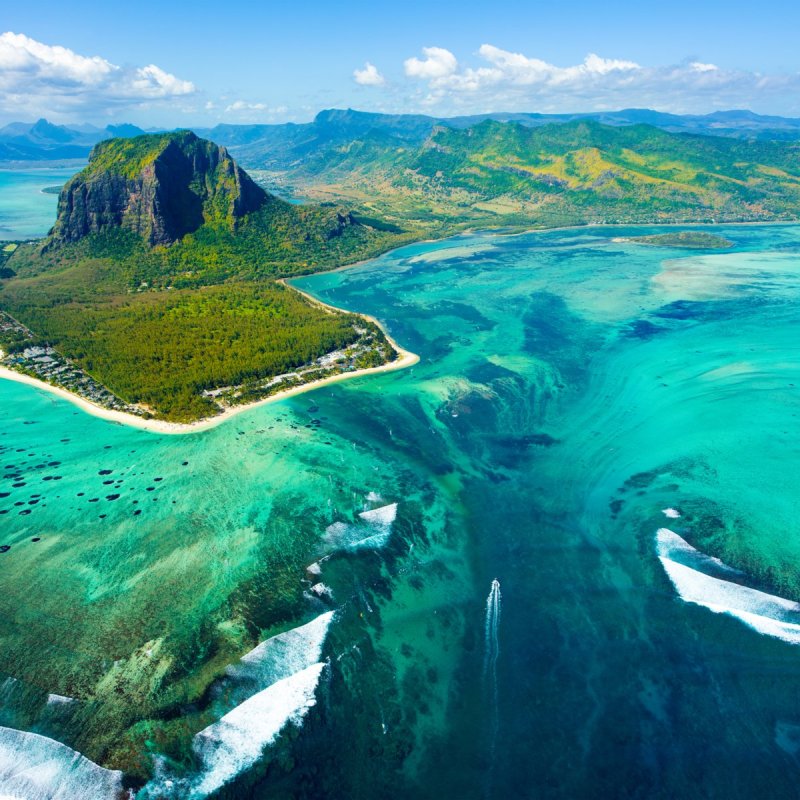
Note: The Travel Awaits team regularly updates content to provide the latest, and most accurate information to our readers. The updated content in this article may not reflect the views or opinions of the original author.
Videos by TravelAwaits
If you like to travel, you’ve probably seen all kinds of waterfalls — from the world-renowned Niagara Falls to the fleeting, spectacular so-called Firefall in Yosemite National Park. Chances are, however, that you haven’t seen a stunning underwater waterfall.
Off the coast of Mauritius, a small island in the Indian Ocean, there is a UNESCO World Heritage Site, a spectacular waterfall submerged in the ocean itself.

The Mauritius Underwater Waterfall
The Republic of Mauritius is an island nation approximately 1,200 miles southeast of Africa. The republic has a population of 1.3 million, most of whom are of Indian descent. The rest of the people are of Creole, Chinese, French, English, and South African descent, CNN explains. The country’s official language is English.
This small Island in the Indian Ocean is situated on an ocean shelf that rises up from the ocean floor. From the island’s shore, there is a gradual slope leading out to a sudden 2.5-mile drop to the ocean floor, a Culture Trip article explains.
The “waterfall” is actually an optical illusion formed by sand and silt deposits sliding down the slope and then dropping into the abyss. As the CNN article explains, the “sand and silt on the ocean floor run off in a way that makes it look like they’re pouring down a waterfall — or like the entire island is being sucked down a vast drain.”
It’s difficult to see this stunning underwater waterfall from the shore. To truly see what appears to be the flowing water, you need to be above the water, looking down. The good news is that tourists are welcome and helicopter tours are available to help them see the spectacular effect.

Other Natural Wonders to See
Let’s be honest: Traveling at least 9,000 miles is a long way to see one thing — no matter how cool it is. Fortunately, Mauritius has a number of attractions that make it an island paradise.
Pereybere Beach
For example, Pereybere Beach, the island’s website explains, is recommended for family swimming because it’s “a quiet place with a calm sea,” so it’s ideal for inexperienced swimmers. Note that although nudism is prohibited at the beach, topless sunbathing is allowed.
Le Morne Cultural Landscape
The waterfall illusion occurs off the coast of the Le Morne Cultural Landscape, marked by a basaltic monolith that sits at the end of the Le Morne Brabant peninsula. The site is a UNESCO World Heritage Site because it was used “as a shelter by runaway slaves, maroons, through the 18th and early years of the 19th centuries,” the World Heritage Site listing explains.
Black River Gorges National Park
Finally, no trip to Mauritius would be complete without visiting the 17,000-acre Black River Gorges National Park, made up of “rolling hills, deep valleys, spectacular waterfalls, and unparalleled beauty of flora and fauna.” While visiting the park, you can visit Alexandra Waterfall and even hike to Black River Peak — the island’s highest point. Although different, the nature here is as stunning as it is on Socotra Island.

Know Before You Go
Mauritian borders have been open again since Mauritius lifted its COVID-19 entry requirements on 1 July 2022. Travelers, whether vaccinated or not, no longer need to take a test or self-isolate on arrival. Foreign tourists are granted visas for a cumulative period that does not exceed 180 days in a calendar year, but you can apply for a Premium Visa during your stay on the island.
Their Ministry of Health may ask for your blood sample either upon your arrival at the airport or at a later stage during your stay if you have traveled from a country where malaria is common. Otherwise, there are no malarial mosquitos on the island.
More travel information may be found here.
FAQs
Is it safe to dive in Mauritius?
Yes, it is. Diving is safe on all sides of Mauritius. The island is almost completely surrounded by a halo of coral that protects many of its bays and coves. The inside of that barrier reef is very shallow and calm which makes for some very good locations for beginner divers to snorkel in placid lagoons and shallows full of fish. Advanced divers can dive in stronger currents and rough seas or shark-infested waters.
Are there any other famous waterfalls in Mauritius?
Yes, there are. Hidden among the lush tropical terrain are some breathtakingly beautiful waterfalls. Often found in serene, isolated parts of the island, trekking to see the waterfalls is a perfect way to reconnect with nature, breathe fresh air, and surrender to a sense of calm and inner peace. Some of the more popular sites are Alexandra Falls, Tamarind Falls, Eureka Falls, Grand River South-East Waterfalls, and many more.
How safe is Mauritius for tourists?
With crime levels being low, Mauritius is a safe place for tourists. However, petty crime does occur, including pickpocketing and bag snatching. Walking alone after dark or using ATMs on the streets is not recommended. Banks, hotels, or shops are safe locations to withdraw cash. Also, make sure not to get conned over accommodation. There were cases of robbery and assaults in unregistered beachside bungalows.
How deep is the Mauritius underwater waterfall?
The shelf that Mauritius sits on is not deeper than 150 meters below sea level. But there’s also another section called the ‘drop-off’ that goes beyond the shelf’s edge where Mauritius underwater waterfall plunges an astonishing 4,000 meters into an unknown abyss. Due to this marine formation, there is a unique harmony of shades that creates the optical illusion captivating so many divers and other admirers worldwide.
Where is the largest underwater waterfall on Earth?
Located in the little slice of ocean between Greenland and Iceland is the gigantic waterfall known as the Denmark Strait cataract. Its height is approximately 11,500 feet, while, in comparison, the largest waterfall on land is merely 3,212 feet tall. The Denmark Strait cataract is formed by the difference in temperature when the freezing Arctic waters meet the slightly warmer Irminger Sea. When that happens, the slides right down through it to the bottom of the ocean. This phenomenon is the key to the functioning of the deep-sea ecosystem in the area.
